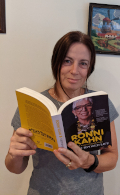Dear reader,
Welcome to the May 2021 edition of The Director’s Dilemma. Each month this newsletter looks at a real-life scenario that happened to a board, perhaps to a board like yours, and considers a range of responses. The scenarios are de identified to protect the individuals concerned.
Of course, these scenarios are general, written to help you with practical information without the risks that attach to living these situations in real-life. I would love to help you with specific advice tailored to your precise board needs. On 6 May I shall be hosting a free online live webinar to share insights into what makes a board successful. Details are below the case study and I look forward to seeing some dilemma-readers at the event.
This month our case study considers the spirit and the letter of the constitution when a non-profit organisation goes into unprecedented territory.
I have over twenty-two years’ experience consulting to, and serving on, boards. It is a pleasure to share some of it with you in this newsletter and I would be even more delighted to share it with you when your board needs a performance review, strategy workshop, or director education session.
To read this email in a web browser, go to www.mclellan.com.au/newsletter.html and click on 'read the latest issue'. I hope you will enjoy the latest dilemma:
 Gabriella is a director on both the state body (which she chairs) and the federated national body of a non profit health advocacy organisation.
Gabriella is a director on both the state body (which she chairs) and the federated national body of a non profit health advocacy organisation.
The constitution states that directors must not be paid for their roles and that each state body may nominate one of its directors to be a director of the national body. Traditionally, the chair joins the national board. The national board often argue about where to spend funds as each state chair tends to favour his or her own state.
Two months ago the two largest state bodies merged. The merged entity asked for two board seats. They nominated the chair of the merged board and the CEO of the merged entity as their national board representatives.
The other states and the national board are unhappy. They fear this voting block could be a defacto takeover and will make the decisions on revenue collection and allocations for expenditure even more vexed than they are at the moment.
They are objecting on the grounds that the CEO is paid and therefore can’t be a director, and that the merged entity is now only one ‘state body’ so only gets one board seat.
The national chair is avoiding conflict and dithering over a decision, wanting to simply get legal opinion on the matter and then do whatever the lawyers recommend.
Gabriella is not sure that legal advice will solve the issues, she feels that there is more need for shared vision and leadership.
How can she help the chair to a better decision?

 Gabriella has three options:
Gabriella has three options: It is time for the national board to unite and plan for a different future.
It is time for the national board to unite and plan for a different future. Gabriella is a wise director who recognizes the larger issues. What kind of leadership will take the non-profit to a successful future? And what might have to change about its governance approach to get that kind of leadership?
Gabriella is a wise director who recognizes the larger issues. What kind of leadership will take the non-profit to a successful future? And what might have to change about its governance approach to get that kind of leadership?

